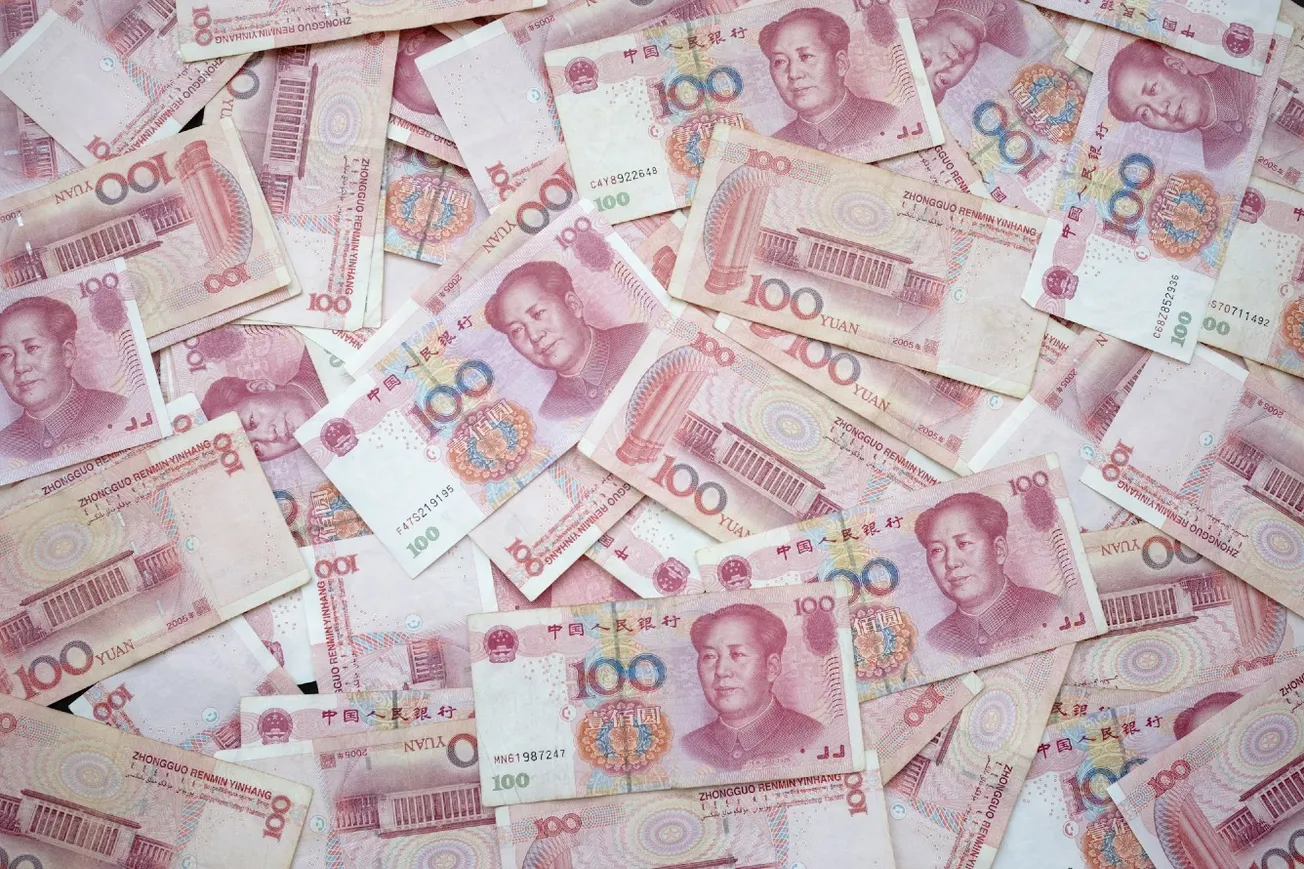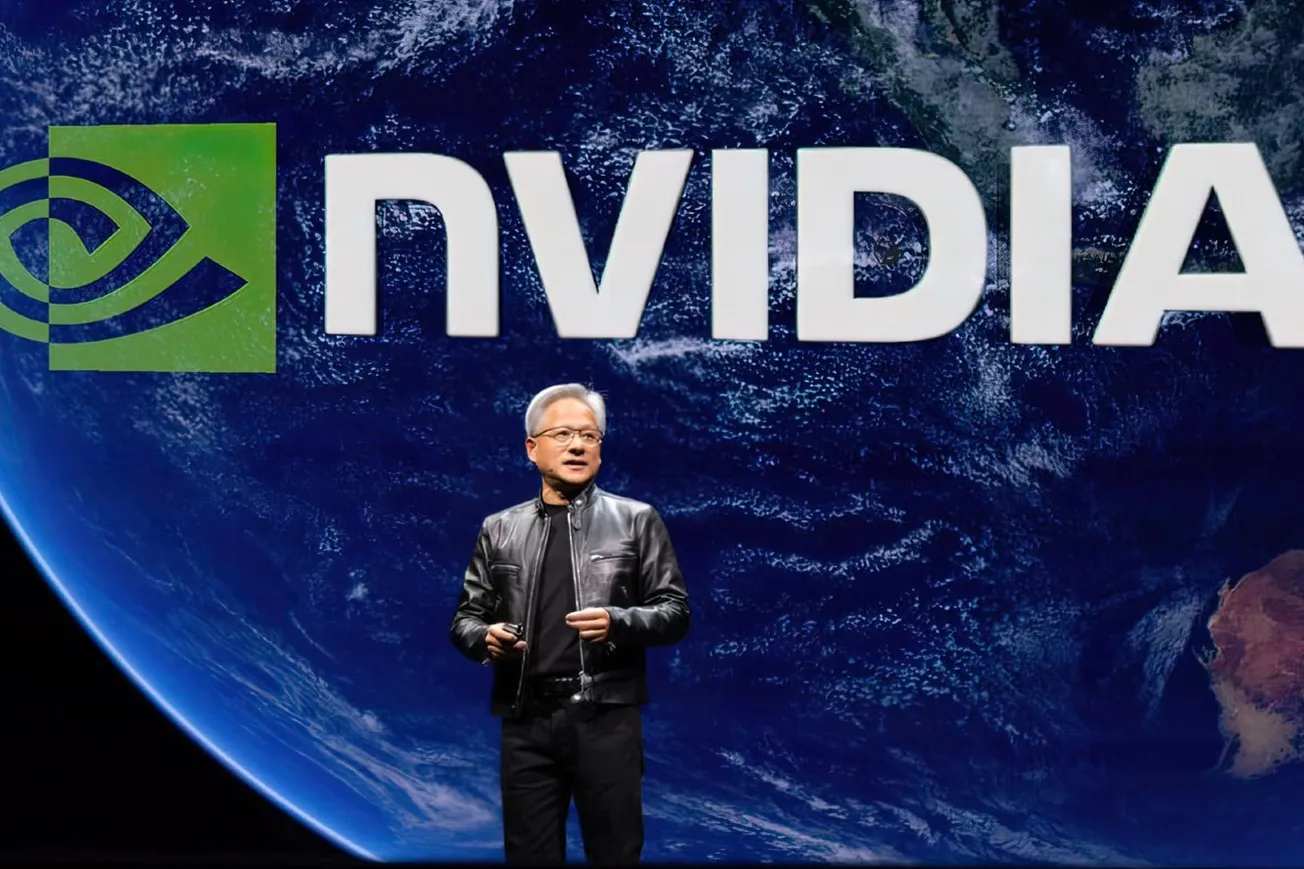President Donald Trump's advocacy for tariffs is genuine, even if the actual levels of those tariffs shift around a bit. Trump genuinely believes that moving to tariffs, and away from free trade, will restore America's former industrial dominance and bring in hundreds of billions in new outside investment. Americans mostly agree with Trump, the latest I&I/TIPP Poll shows
The April online national I&I/TIPP Poll, taken from March 26-28, asked 1,452 voters a number of questions related to tariffs. The first asked: "Do you support or oppose the U.S. placing new tariffs on goods imported from other countries?"
The overall response was close, with 44% saying they either "support strongly" (23%) or "support somewhat" (21%) the tariffs, while 42% said they either "oppose strongly" (27%) or "oppose somewhat" (15%). Of the remainder, 13% said they weren't sure. The poll's margin of error is +/-2.6 percentage points.
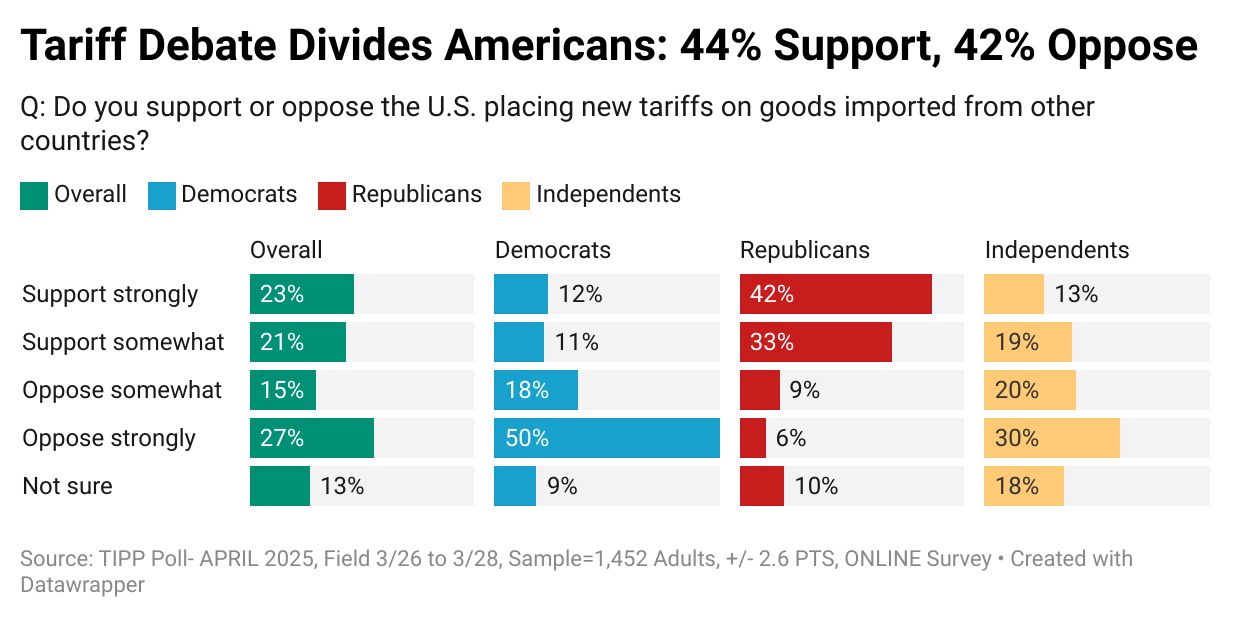
But there's a sharp difference in responses based on party affiliation, with Republicans pretty much alone in their enthusiasm (76% support, 14% oppose), while Democrats (23% support, 68% oppose), and independents (32% support, 50% oppose) show little backing for the idea.
And there are other interesting demographic schisms.
For one, men (54% support, 37% oppose) are nearly polar opposite to women (36% support, 47% oppose) on the tariff issue.
And whether you're an investor or not is also a big deal: Those who identify as investors strongly back the idea (60% support, 35% oppose) while non-investors don't (38% support, 46% oppose).
A second question asked a slightly more nuanced question about tariffs: "Some people believe that President Trump’s strategy of reciprocal tariffs — matching tariffs imposed by other countries — is a fair approach to trade. Do you agree or disagree?"
On this query, overall, it was much closer (47% agree, 38% disagree). By party, it broke down to Republicans (76% agree, 13% disagree), Democrats (26% agree, 64% disagree), and independents (38% agree, 42% disagree), inching a bit closer to one another in their responses.
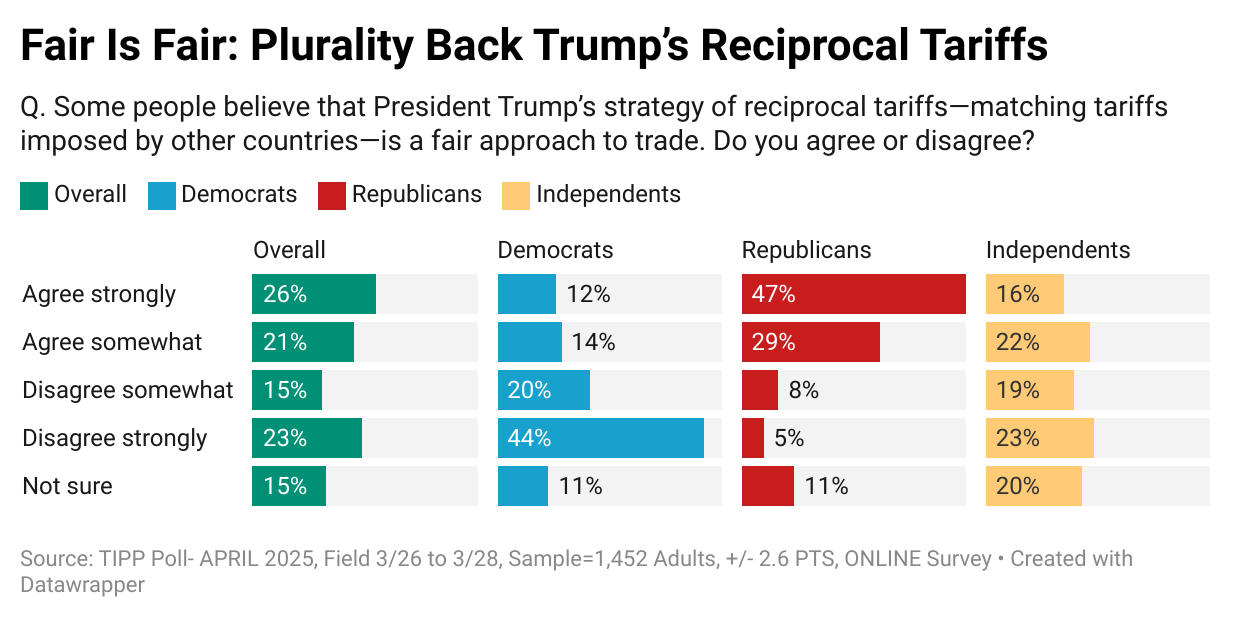
In a third query, respondents were asked: "To what extent do you agree or disagree with the following statement: Imposing tariffs will incentivize foreign companies to manufacture within the United States."
This time, 46% agreed and 32% disagreed. That was reflected in the partisan answers, with GOP voters (76% agree, 11% disagree) moving a tad closer to the Democrats (30% agree, 52% disagree) and independents (38% agree, 37% disagree) now in the plus column.
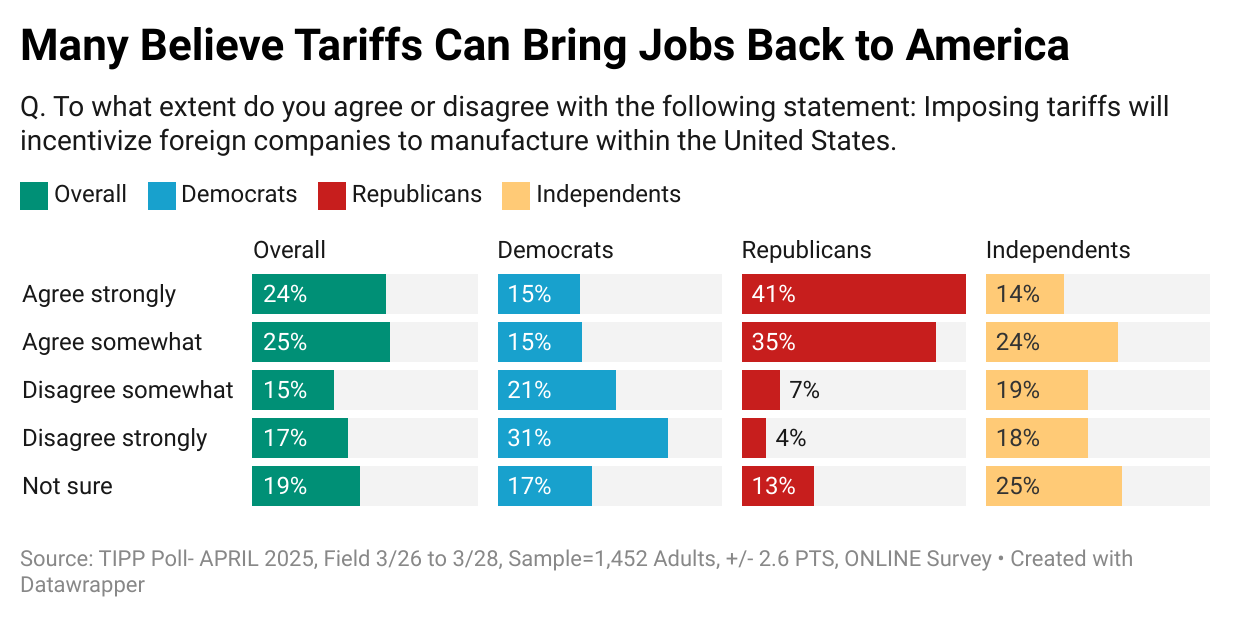
A fourth tariff question wondered: "Companies like Apple, Honda, and Johnson & Johnson have committed to investing more in the U.S. since Trump took office. How much do you believe President Trump’s tariff policies contributed to these decisions?"
Here, an overall plurality strongly believes it was either "A great deal/Quite a lot" (46%) rather than "Very little/None" (17%).
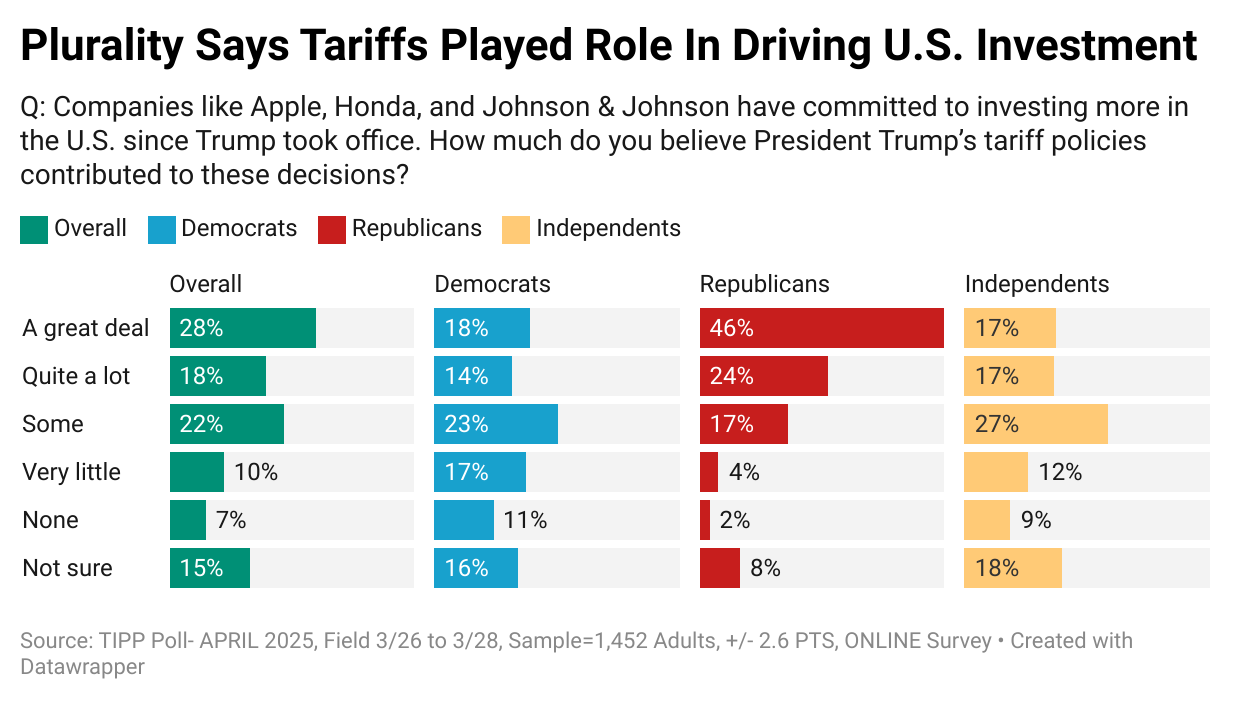
Regardless of political persuasion, most agreed, with Republicans once again tops in support at (70% "A great deal/Quite a lot," 6% "Very little/None"), but most Democrats (32% "A great deal/Quite a lot," 28% "Very little/None") and independents (34% "A great deal/Quite a lot," 21% "Very little/None") also agree.
As a final question, I&I/TIPP asked: "Do you think raising tariffs to imports from other countries will do more to protect American jobs and strengthen the U.S. economy, do more to raise consumer costs and harm the U.S. economy, or will it not have much impact either way on the U.S. economy?"
The overall response was inconclusive, with 38% saying higher tariffs would "do more to protect American jobs and strengthen the U.S. economy," 39% answering they would "do more to raise consumer costs and harm the U.S. economy," 9% responding they would "not have much impact either way," and 14% not sure.
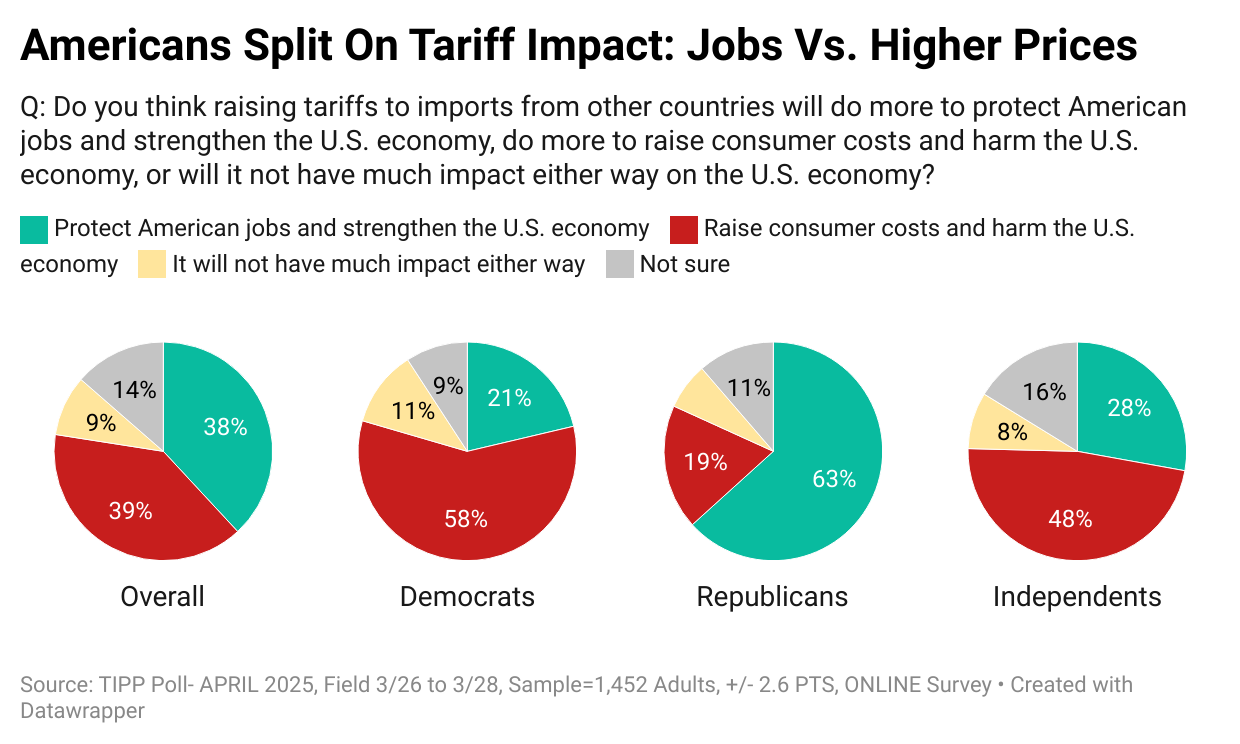
Again, the political schism was great, with 63% of Republicans in the "protect jobs and strengthen the economy" camp, while just 21% Democrats and 28% of independents agreed. On the other hand, 58% of Democrats and 48% of indies agreed that tariffs would "raise costs and harm the economy," versus just 18% of Republicans.
So tariffs are a trouble spot for Trump, but also an opportunity.
On the one hand, Trump seeks to overturn the post-World War II economic consensus (not always followed by even its most ardent advocates) that free trade is better than managed trade, and that global prosperity depends on lowering barriers, not raising them.
But Trump sees the tariff issue not simply in terms of economic efficiency, but rather as an issue of political fairness. And Trump's ascent as a formidable national political figure has been built on that, with voters in industrially depressed regions of the Midwest, Mid-Atlantic and South crossing over from the Democrats to support him in the 2024 election.
That wave of support has made Trump a genuinely populist phenomenon.
However, even among conservative think tanks (such as here, here, and here), there is significant pushback on tariffs, which get little backing from free-traders on both sides of the political spectrum who thought they had permanently won the debate.
But that was before Trumpian trade populism catapulted him into the White House. Twice.
Can Trump continue to win on this issue? It seems so. A recent poll by the Hoover Institution and YouGov found that views on tariffs "soften" when Americans think foreign companies and governments pay them, not Americans, or if U.S. tariffs are set to equal those that other nations impose on U.S. goods.
"Respondents who believe foreign companies or countries are responsible for paying the tariffs are much more likely to support tariffs than those who believe domestic sources pay the tariffs," the survey found.
That is similar to I&I/TIPP's findings on tariffs and foreign investment. If Americans believe investment is coming back, and they don't experience a price shock from tariffs, opposition would likely dwindle. Hard to argue with more jobs, more investment, and stable prices.
Trump hasn't, perhaps, helped his case for tariffs with recent comments, some of which were taken out of context and made to show Trump as callous about the impact of higher prices.
For instance, when recently asked about higher tariffs on cars leading potentially to increased prices, Trump responded:
I couldn’t care less. I hope they raise their prices, because if they do, people are gonna buy American-made cars. We have plenty.
Of course, that response was spun to make it seem as if Trump didn't care about higher prices on cars. But, as the White House later noted, "I hope they raise their prices" was directed at foreign producers, because if they raise prices, it means more sales, production and jobs here in the U.S.
And even those who strongly support Trump argue he should be focusing on permanent spending cuts (DOGE) and tax cuts to make a significant dent in the $2 trillion a year fiscal deficit that threatens America with financial insolvency. They see tariffs as a sideshow.
Right now, it's clear Americans are split on tariffs, mostly along political lines, as the I&I/TIPP Poll data show.
It seems likely that, to make durable changes in U.S. trade and tariff policy, Trump might need to sharpen and clarify his economic message to build broader support for his plan to use tariffs to retool the U.S. and rebuild our nation's ailing, deindustrialized heartland.
I&I/TIPP publishes timely, unique, and informative data each month on topics of public interest. TIPP’s reputation for polling excellence comes from being the most accurate pollster for the past six presidential elections.
Terry Jones is an editor of Issues & Insights. His four decades of journalism experience include serving as national issues editor, economics editor, and editorial page editor for Investor’s Business Daily.
TIPP Picks
Selected articles from tippinsights.com and more
1. Trump Acts To Protect American Voters—Hans von Spakovsky, The Daily Signal
2. Jasmine Crockett Misrepresented Me In NPR Hearing. I’m Setting The Record Straight.—Mike Gonzalez, The Daily Signal
3. Usually-Vocal Democrats Suddenly Silent About Palestinian Protests When They’re Against Hamas—Audrey Streb, DCNF
4. Feds Spent Roughly $1 Billion To Conduct Survey That Could’ve Been Done For $10,000, Musk Says—Hailey Gomez, DCNF
5. Black Voter In Swing State Says The One Thing Democrats Don’t Want To Hear—Mariane Angela, DCNF
6. ‘I’m Worried’: James Carville Reveals His ‘Only Hope’ For Combating Trump Admin — But There’s A Problem—Jason Cohen, DCNF
7. Democrat Appointed District Judge Orders Trump Officials To Preserve Texts About Yemen Strikes—Mariane Angela, DCNF
8. Karoline Leavitt: What It’s Really Like Working For President Trump—Bradley Devlin, The Daily Signal
9. Stefanik Nomination Pulled To Protect Passage Of Reconciliation, White House Official Says—Elizabeth Troutman Mitchell, The Daily Signal
10. A Glimmer Of Hope In Difficult Ukraine Peace Talks?—George Caldwell, The Daily Signal
11. Border Patrol Recruiter Asked To Leave California High School Career Fair—Virginia Allen, The Daily Signal
12. DOJ Attorney Liz Oyer Said Trump Fired Her Over Mel Gibson’s Guns — Turns Out She Was Mega-Progressive Activist—Eireann Van Natta, DCNF





